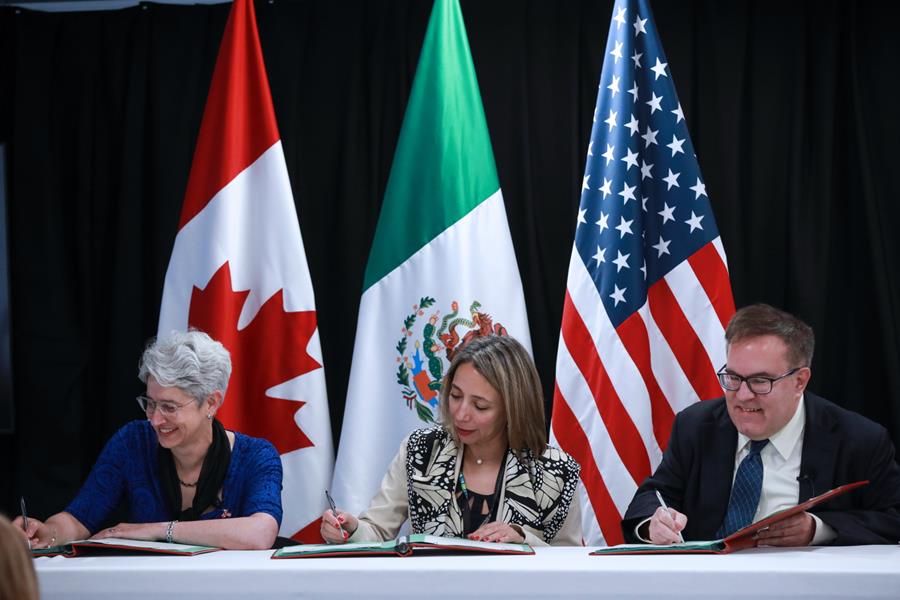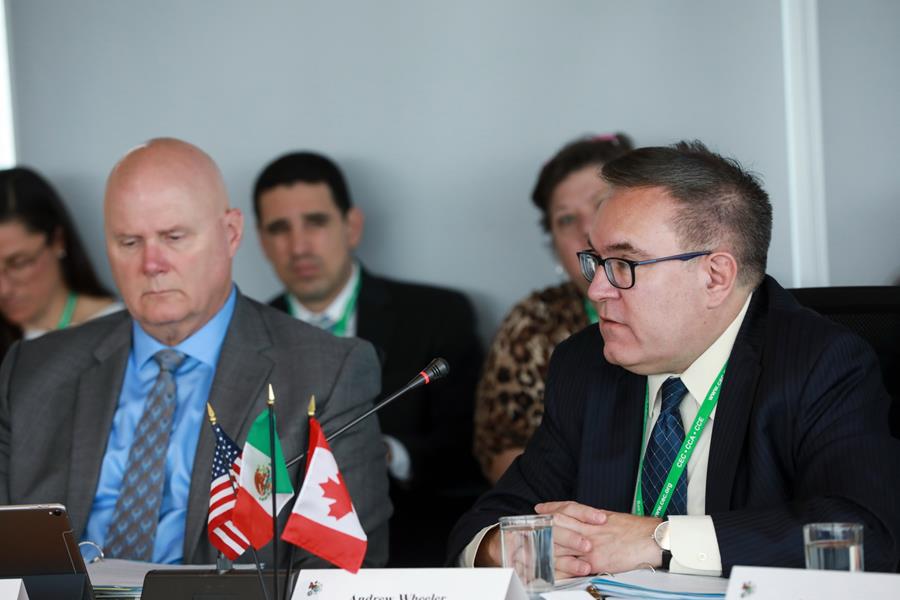
Administrator Wheeler Discusses North American Environmental and Transboundry Water Issues with Canada, Mexico at CEC
(MEXICO CITY) – Today, U.S. Environmental Protection Agency Administrator Andrew Wheeler wrapped up trilateral meetings with Canada and Mexico as part of the 25th Anniversary of the Commission for Environmental Cooperation (CEC) Council meetings in Mexico City. The meetings focused on resource efficiency, including working together to combat marine debris, and to encourage innovation and build partnerships to expand environmental protection and sustainable growth.
"I am pleased to work with my counterparts across North America to tackle some of our most pressing environmental issues such as water infrastructure and marine litter," said Administrator Wheeler. "Our trilateral work on marine litter mitigation in communities along our shared border watersheds will help produce a toolkit and best practices that can be replicated in other North American communities and across the globe."
In a closing trilateral statement, members of the CEC reaffirmed its determination to continue the work of protecting the environment and ecosystems, as well as to encourage innovation and build partnerships in favor of sustainable growth. Additionally, the nations agreed to increase cooperation between our countries on trade and environment priorities to protect and enhance the North American environment. The full statement is available here: http://www.cec.org/news-and-outreach/press-releases/cec-council-statement-2019
This year, Mexico hosted the Regular Session, with the participation of over 200 representatives from government, Indigenous communities, civil society groups, academia, the scientific community, and the private sector.
Of note, Administrator Wheeler announced the launch of the EcoInnovation Network. This network will facilitate the creation of innovation centers in North America with a focus on cultivating North American leaders in innovation, entrepreneurship and sustainable growth.
"Through this network, innovation centers within academic institutions in Canada, Mexico and the United States will share or secure the capacities to empower youth and communities with tools and resources to innovate and succeed in enhancing environmental stewardship," said Administrator Wheeler.
Founding institutions of this Network include: The University of Oklahoma Tom Love Innovation Hub; The University of Oklahoma Ronnie K. Irani Center for the Creation of Economic Wealth; Concordia University, Montreal, Quebec; Universite Laval, Quebec; Simon Fraser University, Vancouver, BC; University of Waterloo, Waterloo, Ontario; University of Anahuac, Mexico City; Universidad Autonoma de Queretaro, Queretaro State.
Administrator Wheeler also had the opportunity to meet with the newly appointed Mexican Minister of Environment and Natural Resources, Victor Manuel Toledo. In their meeting, the two leaders discussed issues of mutual concern including the Border 2020 plan, Tijuana River wastewater and transboundry pollution. Administrator Wheeler also congratulated the Minister and the Government of Mexico for ratifying the USMCA.
Under the Border 2020 bi-national environmental program, the two countries agree to implement core programs to improve air quality, water quality, address solid waste, improve emergency preparedness and response, and enhance environmental compliance. This program encourages participation from communities and local stakeholders within 100 kilometers (62 miles) of the international border between the United States and Mexico.
Additionally, the issue of Tijuana waste water is of concern to both countries, and especially our communities along the border near Tijuana, Mexico and California. The North American Development Bank will be releasing a report in the coming days with results from a diagnostic study that will include infrastructure option on both sides of the border to reduce dry-weather transboundary flows in the Tijuana River.
Administrator Wheeler raised the issue with the Minister, with the goal of developing short and long-term options and strategies to increase capacity and/or replace aging infrastructure to minimize transboundry impacts. The EPA also continues to work closely with border stakeholders to find technical and financial solutions to clean up this wastewater.
Background on the CEC:
The North American Commission for Environmental Cooperation (CEC) was created by the United States, Canada, and Mexico through the North American Agreement on Environmental Cooperation (NAAEC), the environmental side agreement to the North American Free Trade Agreement (NAFTA). The CEC facilitates cooperation among the three nations to conserve, protect and enhance the North American environment, promote sustainable development, and support the environmental goals and objectives of the three Nations. For 26 years, the CEC has advance environmental governance, compliance and enforcement; public participation and transparency. The CEC will continue under the more recently negotiated USMCA.

Members of the Commission for Environmental Cooperation Council sign a cooperative statement in Mexico City on Tuesday. Pitcuted L-R: Isabelle Bérard, Council Alt Rep. from Canada; Norma Munguia, Council Alt Rep from Mexico; Andrew Wheeler, U.S. EPA Administrator.

Environmental Protection Agency Administrator Andrew Wheeler addresses the North American Commission for Environmental Cooperation in Mexico City on Tuesday.
US EPA, Office of Public Engagement, 1200 Pennsylvania Avenue NW, Washington, DC 20460 United States






0 comments:
Post a Comment